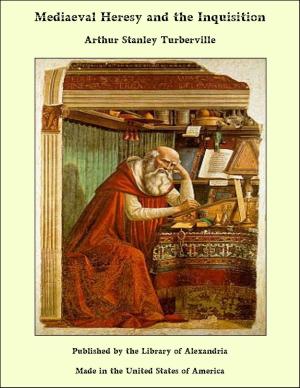| Author: | Irene Miller | ISBN: | 9781465624512 |
| Publisher: | Library of Alexandria | Publication: | March 8, 2015 |
| Imprint: | Language: | English |
| Author: | Irene Miller |
| ISBN: | 9781465624512 |
| Publisher: | Library of Alexandria |
| Publication: | March 8, 2015 |
| Imprint: | |
| Language: | English |
Evarne Stornway hurried across the fields towards Heatherington at a speed that deprived her gait of much of that graceful yet somewhat insolent sway that caused it to be alike the butt and the envy of the other youthful females of the neighbourhood. Not an hour since she had first heard beyond a doubt the gentle rustling of the wings of the Angel of Death within the sick-room of her father, and, goaded by cruel anxiety, she was—even against the invalid's will—seeking medical aid. The rapid walk brought brightness to eyes and cheeks, thereby doing much to restore that subtle air of perfect health and happiness that usually added so much to the girl's beauty. But always was Evarne fair to behold; her dark eyes, so large and limpid, were expressive and intense; her lips, alluring in curves and colour, spoke to the "seeing eye" of both kindliness and individuality. Yet she could have dispensed with all the charm given by mental grace, and still riveted attention, for she possessed loveliness of that type, supreme above all others, that is independent of expression—the beauty of grace, symmetry of form, and faultless feature. And for this she had been taught to thank—not chance, not merely heredity, but the determination of her father. Leopold Stornway had a passionate adoration for physical beauty, regarding it as almost the first of virtues. And more, he was proud of the vast importance he placed on bodily perfection, for was it not a reverence characteristic of classic Greece? There it was—in the records of the never-to-be-forgotten days of antiquity—that Leo found all his chief interests. Egypt, Mesopotamia, Rome, and, above all, Greece—each in turn had been the lands of his adoption. Pericles and Cæsar, Cyrus and Rameses, Shalmanesur and Hiram, were the gods of his idolatry. He knew and cared more concerning the triumphant fortunes of Semiramis; the proceedings of Antigone or of Theseus; the adventures of Agamemnon or Achilles, of Hector or the pious Æneas at the Siege of Troy, than he did of the doings of those who sat in the seats of the mighty in his own century. The happiest time of his life had been his three years at Oxford. Almost immediately on leaving college he married—simply because she was beautiful as any Greek statue—a young woman considerably beneath him in station, and possessed of an unconquerably violent temper. He knew right well, even during the period of his deepest infatuation, that he had found no mate for his soul. He was sadly conscious that that part of his mind—of his spirit—that he cared for most deeply, never would—never could—unveil itself to the scrutiny of his chosen life-long companion. To feed his intellectual affections, he relied on the continuance of his college friendship with the brilliant and vivacious Morris Kenyon. But herein he was doomed to disappointment. After a brief spell of vain struggling for literary recognition in London, Leo settled down, contentedly enough, to obscurity in the depth of the country. There he spent peaceful days occupied in highly intellectual yet miserably paid writings. Each year he became more of a recluse—more out of touch with the times. Morris Kenyon likewise altered. Plunged into the vortex of town life, seeing and doing everything, going everywhere, courted and flattered and popular, not only on account of his great wealth but for his more personal attractions—every year he drifted farther from being the Morris of yore. The change in both men was but gradual, and through varying stages of disillusion and disappointment, their ardent friendship was long in dying. But the time came when all ended—even correspondence ceased. Leo's marriage was more successful. His wife made strenuous efforts to rise to his heights, while his admiration of her stately loveliness never waned. Their first child was a boy, who died in infancy, but ere long little Evarne came as consoler.
Evarne Stornway hurried across the fields towards Heatherington at a speed that deprived her gait of much of that graceful yet somewhat insolent sway that caused it to be alike the butt and the envy of the other youthful females of the neighbourhood. Not an hour since she had first heard beyond a doubt the gentle rustling of the wings of the Angel of Death within the sick-room of her father, and, goaded by cruel anxiety, she was—even against the invalid's will—seeking medical aid. The rapid walk brought brightness to eyes and cheeks, thereby doing much to restore that subtle air of perfect health and happiness that usually added so much to the girl's beauty. But always was Evarne fair to behold; her dark eyes, so large and limpid, were expressive and intense; her lips, alluring in curves and colour, spoke to the "seeing eye" of both kindliness and individuality. Yet she could have dispensed with all the charm given by mental grace, and still riveted attention, for she possessed loveliness of that type, supreme above all others, that is independent of expression—the beauty of grace, symmetry of form, and faultless feature. And for this she had been taught to thank—not chance, not merely heredity, but the determination of her father. Leopold Stornway had a passionate adoration for physical beauty, regarding it as almost the first of virtues. And more, he was proud of the vast importance he placed on bodily perfection, for was it not a reverence characteristic of classic Greece? There it was—in the records of the never-to-be-forgotten days of antiquity—that Leo found all his chief interests. Egypt, Mesopotamia, Rome, and, above all, Greece—each in turn had been the lands of his adoption. Pericles and Cæsar, Cyrus and Rameses, Shalmanesur and Hiram, were the gods of his idolatry. He knew and cared more concerning the triumphant fortunes of Semiramis; the proceedings of Antigone or of Theseus; the adventures of Agamemnon or Achilles, of Hector or the pious Æneas at the Siege of Troy, than he did of the doings of those who sat in the seats of the mighty in his own century. The happiest time of his life had been his three years at Oxford. Almost immediately on leaving college he married—simply because she was beautiful as any Greek statue—a young woman considerably beneath him in station, and possessed of an unconquerably violent temper. He knew right well, even during the period of his deepest infatuation, that he had found no mate for his soul. He was sadly conscious that that part of his mind—of his spirit—that he cared for most deeply, never would—never could—unveil itself to the scrutiny of his chosen life-long companion. To feed his intellectual affections, he relied on the continuance of his college friendship with the brilliant and vivacious Morris Kenyon. But herein he was doomed to disappointment. After a brief spell of vain struggling for literary recognition in London, Leo settled down, contentedly enough, to obscurity in the depth of the country. There he spent peaceful days occupied in highly intellectual yet miserably paid writings. Each year he became more of a recluse—more out of touch with the times. Morris Kenyon likewise altered. Plunged into the vortex of town life, seeing and doing everything, going everywhere, courted and flattered and popular, not only on account of his great wealth but for his more personal attractions—every year he drifted farther from being the Morris of yore. The change in both men was but gradual, and through varying stages of disillusion and disappointment, their ardent friendship was long in dying. But the time came when all ended—even correspondence ceased. Leo's marriage was more successful. His wife made strenuous efforts to rise to his heights, while his admiration of her stately loveliness never waned. Their first child was a boy, who died in infancy, but ere long little Evarne came as consoler.















